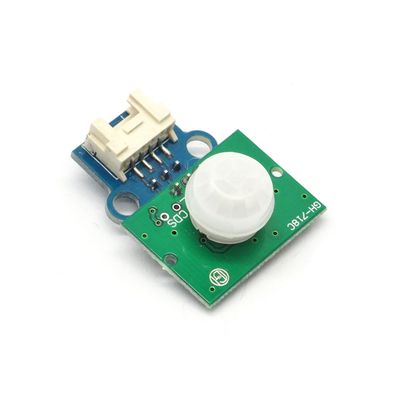PIR Sensor Brick
Contents
Overview
What is an electronic brick? An electronic brick is an electronic module which can be assembled like Lego bricks simply by plugging in and pulling out. Compared to traditional universal boards and circuit modules assembled with various electronic components, electronic brick has standardized interfaces, plug and play, simplifying construction of prototype circuit on one’s own. There are many types of electronic bricks, and we provide more than twenty types with different functions including buttons, sensors, Bluetooth modules, etc, whose functions cover from sensor to motor drive, from Ethernet to wireless communication via Bluetooth, and so on. We will continue to add more types to meet the various needs of different projects.
Electronic brick of PIR sensor can be connected to digital I/O port and used in anti-theft system or to control lights in the staircase of buildings. When sensor detects the infrared signals of human body, it outputs high level; generally speaking, it outputs low level.
Features
1. Plug and play, easy to use. Compatible with the mainstream 2.54 interfaces and 4-Pin Grove interfaces in the market.

2. With use of M4 standard fixed holes, compatible with M4-standard kits such as Lego and Makeblock.

Specifications
| PCB size | 24.0mm X 21.0mm X 1.6mm |
| Working voltage | 5V DC |
| Operating voltage | 3.3V DC |
| Compatible interfaces | 2.54 3-pin interface and 4-pin Grove interface(1) |
Note 1: S for digital output port, V and G for voltage at the common collector and ground respectively
Electrical Characteristics
| Parameter | Min. | Typical | Max. | Unit |
| Working voltage | 4.5 | 5 | 20 | VDC |
| Digital output voltage(VCC=5V) | 0 | - | 3.3 | V |
| Working current(VCC=5V) | - | 50 | - | uA |
| Detection angle(solid angle) | - | - | 110 | ° |
| Detection range | - | - | 7 | m |
| Delay time of high level | - | 2.5 | - | s |
Demo
Connect S port of electronic brick of PIR sensor to D2 port of Arduino board, and we will use the following program to read its digital value. If the digital value read is high level, LED lamp will be ON; when the digital value read is low level, LED lamp will be OFF.
int PIR=2; //connect tilt to D2
int LED=13;
void setup()
{
pinMode(LED, OUTPUT);
pinMode(PIR, INPUT);
}
void loop()
{
if(digitalRead(PIR)==HIGH) //when the digital output value of PIR is high, turn on the LED.
{
digitalWrite(LED, HIGH);
}
if(digitalRead(PIR)==LOW) //when the digital output value of PIR is low, turn off the LED.
{
digitalWrite(LED, LOW);
}
}
Download
Datasheet for PIR Sensor Brick
Schematic for PIR Sensor Brick
Demo code for PIR Sensor Brick
 Notice
Notice